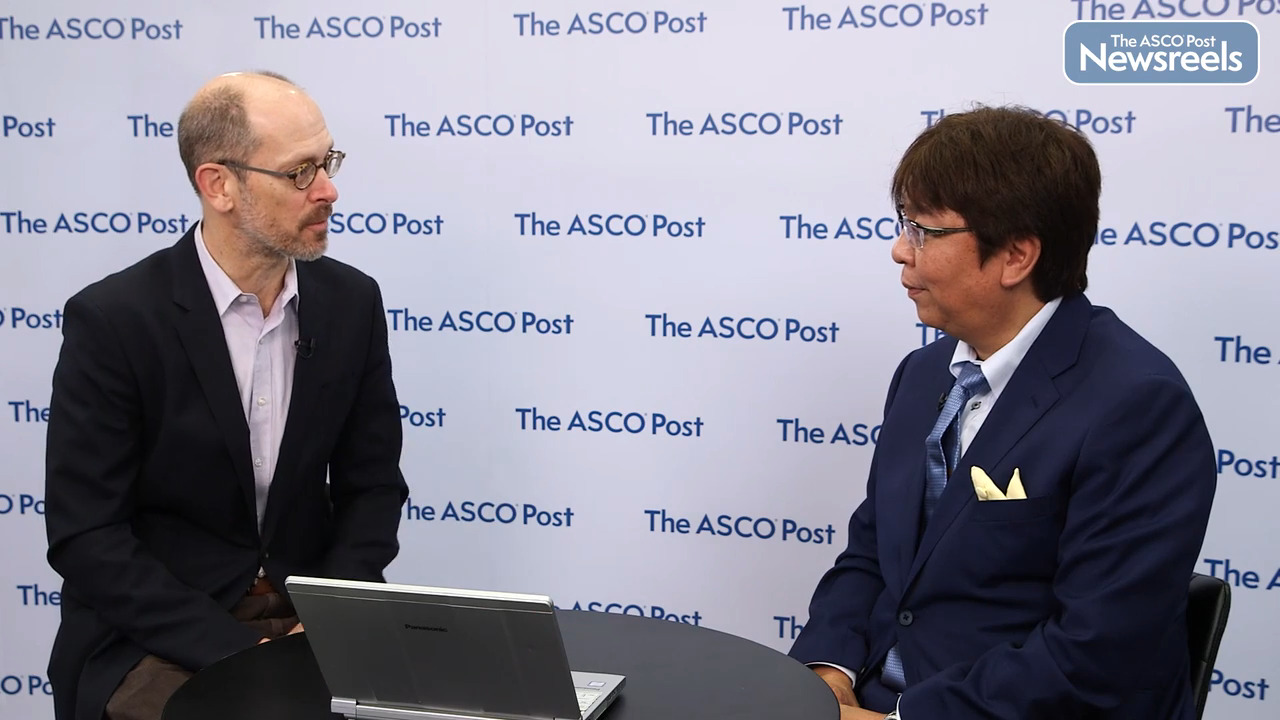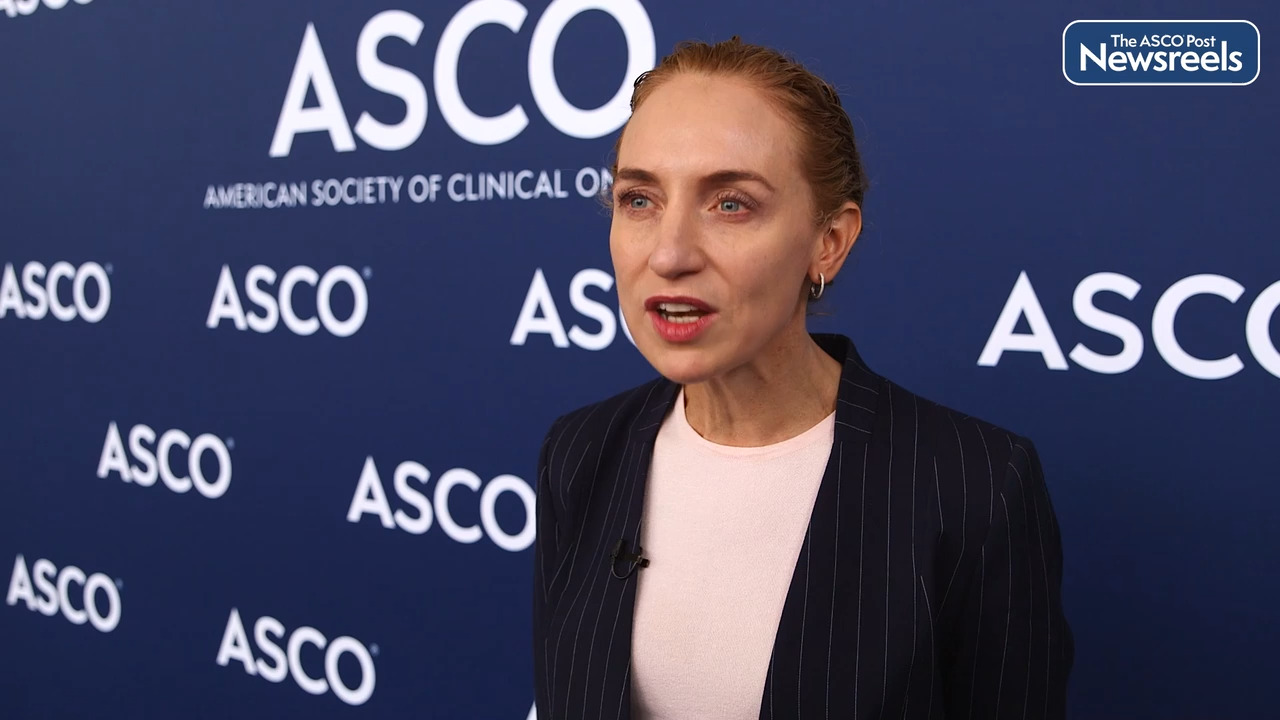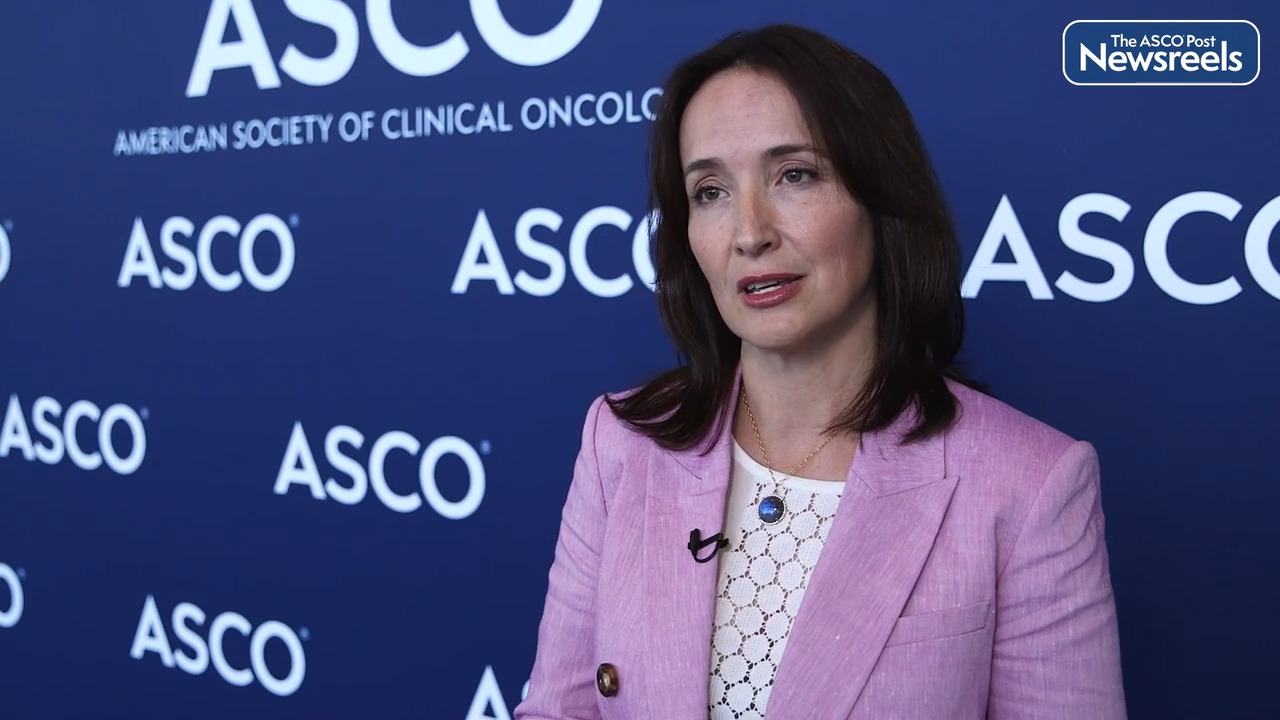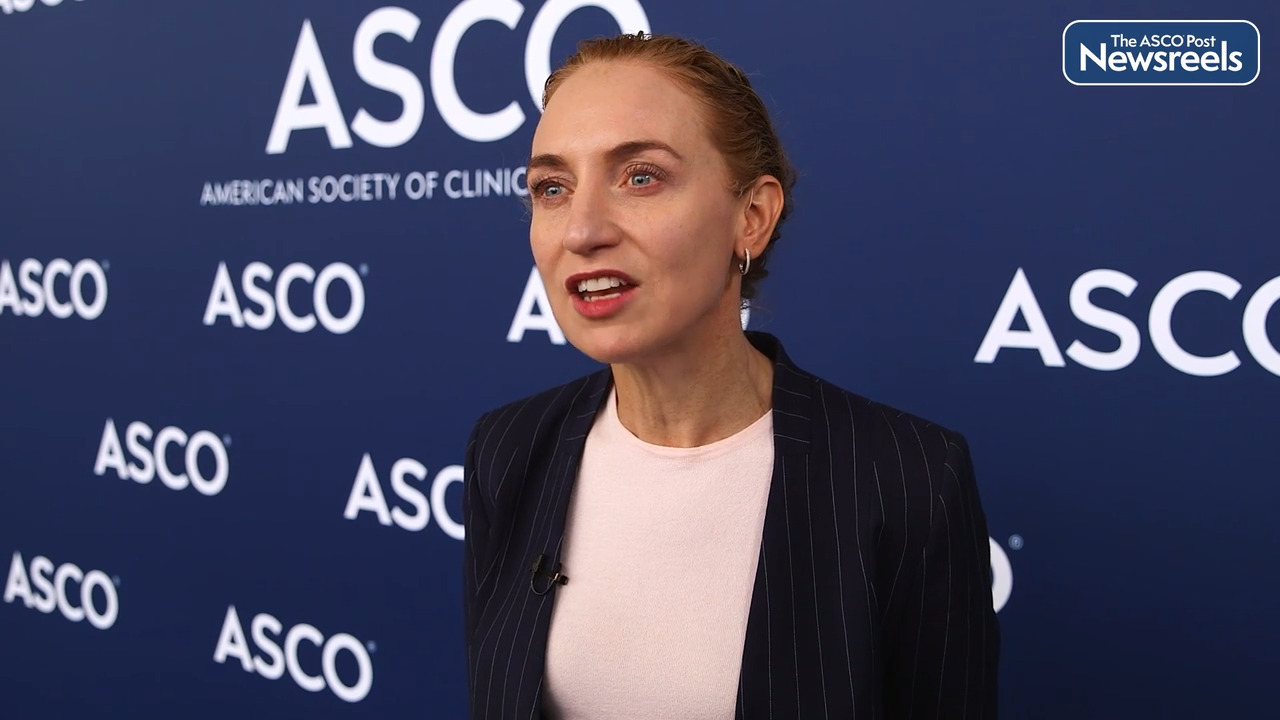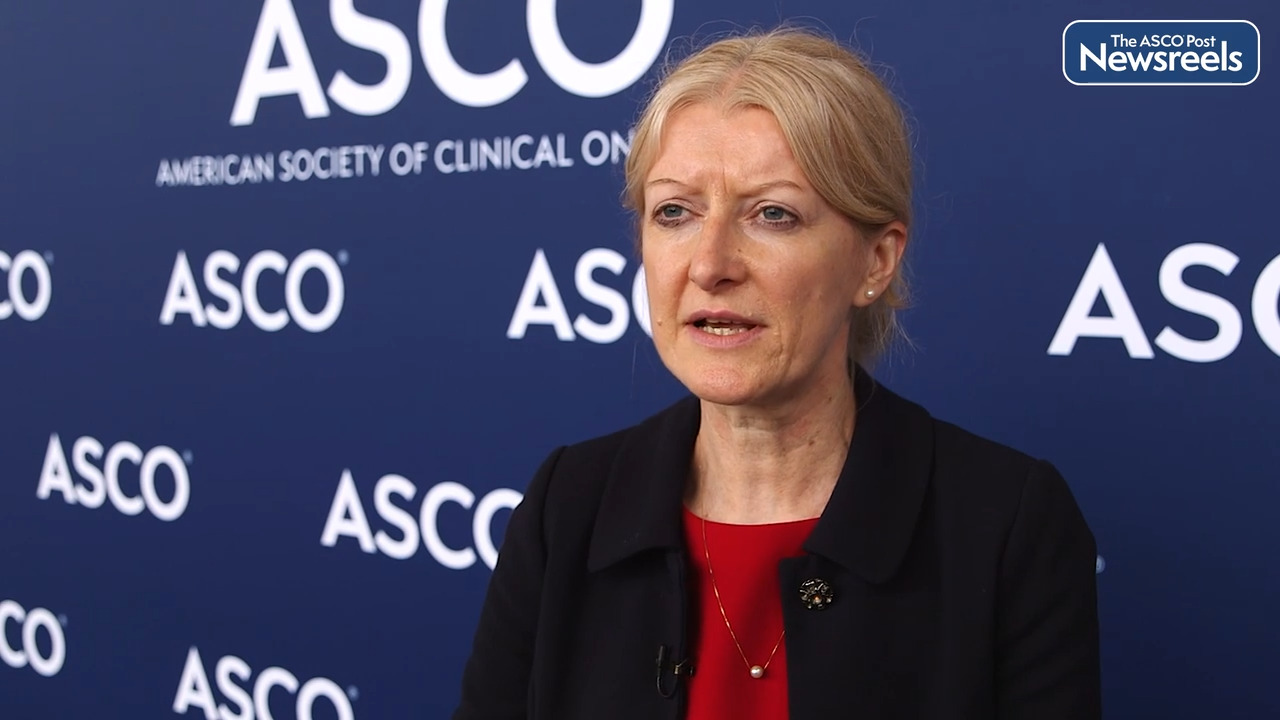Transcript
Disclaimer: This video transcript has not been proofread or edited and may contain errors.
Gilberto de Lima Lopes Jr:
Hello Oladi, thank you for being here with us discussing the presentation that you just did at ASCO 2022. Welcome and please do let us know, why did you set up to do this study assessing data from patients who express PD-L1 at 50% or greater in the first line treatment in metastatic non-small cell lung cancer?
Oladimeji Akinboro:
Yes. Thanks so much, Gilberto, for interviewing me today. So we pursued this study because we just wanted to investigate potential differences in overall survival, progression-free survival, and objective response rates, but with the focus on overall survival in patients with PD-L1 greater than 50, because it's not really clear from the data we have from clinical trials which therapeutic approach or regimens that clinicians should use. From the trials, you may be aware that the control arms in all of the trials has all been platinum-based chemotherapy, whether in comparison with chemoimmunotherapy or with immunotherapy alone. So we just set out to compare chemoimmunotherapy with immunotherapy. Of course, an indirect comparison, but nonetheless one which we felt would be informative to clinicians.
Gilberto de Lima Lopes Jr:
Perfect. We do know that this is a population of patients that did not have [inaudible 00:01:20] mutations, out translocations, or other driver mutations that we would consider tyrosine kinase inhibitors for in the first line.
Oladimeji Akinboro:
Yes, specifically those without EGFR and ALK. Because most of the trials, as at the time when some of them were initiated, those were the biomarkers for which there was very clear evidence that they had targetable... There were drugs that were targeting those biomarkers. So all these trials uniformly screened out patients with EGFR and ALK. It's possible that there may have been some other biomarkers included but EGFR and ALK were not included. So you're right.
Gilberto de Lima Lopes Jr:
Perfect. Your colleagues at the FDA had priorly, last year, shown us data for this subgroup of patients with PD-L1 from one to 49%. So this, in a way, is a follow-up and a continuation of that line of investigation. So what methods did you use, which patients were included, and what type of meta-analysis was this?
Oladimeji Akinboro:
Yes. So what we did was we pulled data from all randomized control trials that supported FDA approvals of chemoimmunotherapy and immunotherapy-only regimens. We have 12 of them. Six of them compared chemoimmunotherapy with platinum-based chemo and six compared immunotherapy alone with platinum-based chemotherapy.
Oladimeji Akinboro:
What we did was, it was a pool analysis. We can't call it meta-analysis because it doesn't really represent the universal trials we had there, but we just pulled everything we had from all those trials. We had 12 of them and had about 3,189 patients in all in the overall population. But after we screened down all those with EGFR and ALK, those who did not have baseline tumor PD-L1 levels documented, and those with PD-L1 less than 50, in all, we had 3,198.
Gilberto de Lima Lopes Jr:
Excellent. Thank you for that clarification on the methods and what to call the study.
Oladimeji Akinboro:
Yes.
Gilberto de Lima Lopes Jr:
What were the main results?
Oladimeji Akinboro:
Yes. So what we did find was that we couldn't really conclude that there is any difference in overall survival between chemoimmunotherapy and immunotherapy alone. The median overall survival was 25 months in the chemoimmunotherapy arm and it was 20.9 months in the immunotherapy-only arm.
Oladimeji Akinboro:
So numerically, it was higher in the chemoimmunotherapy arm, but the hazard ratio was 0.82 and the upper bound of its 95% confidence interval was 1.08, suggesting that one can't really conclude. But again, this is exploratory. It's exploratory and it is retrospective. So we can't really say conclusively or definitively that there is any difference between both, but the results are suggestive that there may be no difference between them.
Gilberto de Lima Lopes Jr:
Can you make comments on response rate and progression-free survival in this study?
Oladimeji Akinboro:
Yes. So regarding progression-free survival, the median was 9.6 months in the chemoimmunotherapy and 7.1 months in the immunotherapy-only arm. The upper bound of the 95% confidence interval for its hazard ratio was 0.87, suggesting in this case that chemoimmunotherapy might result in better PFS outcomes for patients. Similarly, the objective response rate was higher in the chemoimmunotherapy arm at 61% results, [inaudible 00:04:36] 3% in the immunotherapy-only arm. The odds ratio was 1.2 and the 95% confidence interval was 1.1 to 1.3. Also suggesting that chemoimmunotherapy may improve the ORR rate.
Oladimeji Akinboro:
So while in summary, we cannot conclude that there is any difference in overall survival between both arms, but [it] appears that PFS and ORR may be better with chemoimmunotherapy.
Gilberto de Lima Lopes Jr:
Understood. Any subgroups that we should learn about or that there were data that was of significance?
Oladimeji Akinboro:
Yes, thank you. So we looked at specific subgroups defined by age, by performance status, as well as smoking history. That's partly because of practice patterns. A lot of times clinicians tend to give patients who are older and those they deem to have poor performance status. They tend to give them immunotherapy alone. So we looked at patients based on those subgroups.
Oladimeji Akinboro:
In most of the subgroups we examined, it appears that patients do better with chemoimmunotherapy. However, in patients who are age 75 years or older, it did appear that they may do better with IU alone. We also found that with regards to progression-free survival and objective response rates, those results were consistent. So it just generally suggests that adults age 75 years or older, they do better with IU alone. But again, this is retrospective. This is exploratory.
Gilberto de Lima Lopes Jr:
What are the main take-home messages from your study?
Oladimeji Akinboro:
Yes. So the take-home messages are that one, there may be no difference in overall survival between chemoimmunotherapy, and immunotherapy in patients with advanced non-small cell lung cancer who have tumor PD-L1 scores of 50% or higher. However, it appears that progression-free survival and objective response rates may be higher with chemoimmunotherapy, but we must interpret this in the context of the overall survival findings.
Oladimeji Akinboro:
It also appears that older adults age 75 years or older may do better with immunotherapy alone. Overall, I think our conclusion is that, or rather, the implication of this is that we are not prescribing one therapeutic approach over the other here. But overall clinicians and oncologists should discuss with patients and they should be shared decision-making regarding which approach to take.
Gilberto de Lima Lopes Jr:
Sounds like a very sensible conclusion. Oladi, thank you very much for being with us.
Oladimeji Akinboro:
Thank you.
Gilberto de Lima Lopes Jr:
And looking forward to staying in touch.
Oladimeji Akinboro:
Thank you so much, Gilberto.
